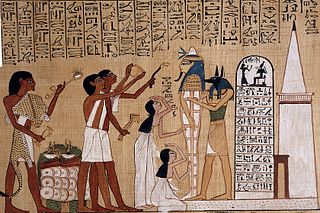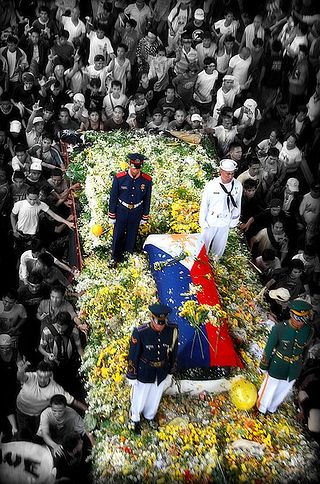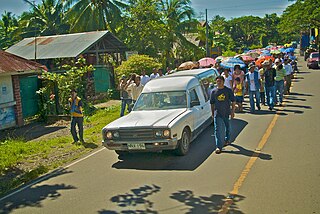
A funeral is a ceremony connected with the final disposition of a corpse, such as a burial or cremation, with the attendant observances. Funerary customs comprise the complex of beliefs and practices used by a culture to remember and respect the dead, from interment, to various monuments, prayers, and rituals undertaken in their honour. Customs vary between cultures and religious groups. Funerals have both normative and legal components. Common secular motivations for funerals include mourning the deceased, celebrating their life, and offering support and sympathy to the bereaved; additionally, funerals may have religious aspects that are intended to help the soul of the deceased reach the afterlife, resurrection or reincarnation.
Shiva is the week-long mourning period in Judaism for first-degree relatives. The ritual is referred to as "sitting shiva" in English. The shiva period lasts for seven days following the burial. Following the initial period of despair and lamentation immediately after the death, shiva embraces a time when individuals discuss their loss and accept the comfort of others.

Mourning is the expression of an experience that is the consequence of an event in life involving loss, causing grief. It typically occurs as a result of someone's death, often someone who was loved, although loss from death is not exclusively the cause of all experience of grief.

The Torajans are an ethnic group indigenous to a mountainous region of South Sulawesi, Indonesia. Their population is approximately 1,100,000, of whom 450,000 live in the regency of Tana Toraja. Most of the population is Christian, and others are Muslim or have local animist beliefs known as aluk. The Indonesian government has recognised this animistic belief as Aluk To Dolo as well as Hindu Alukta, namely, a form of Hinduism in Indonesia.

A wake, funeral reception or visitation is a social gathering associated with death, held before a funeral. Traditionally, a wake involves family and friends keeping watch over the body of the dead person, usually in the home of the deceased. Some wakes are held at a funeral home or another convenient location. The wake or the viewing of the body is a part of death rituals in many cultures. It allows one last interaction with the dead, providing a time for the living to express their thoughts and feelings with the deceased. It highlights the idea that the loss is borne by the whole community and is a way of honoring the deceased member. The emotional tone of a wake is sometimes seen as more positive than a funeral due to the socially supportive atmosphere and the focus on the life rather than the death of the deceased.

Preta, also known as hungry ghost, is the Sanskrit name for a type of supernatural being described in Hinduism, Buddhism, Taoism, and Chinese folk religion as undergoing suffering greater than that of humans, particularly an extreme level of hunger and thirst. They have their origins in Indian religions and have been adopted into East Asian religions via the spread of Buddhism. Preta is often translated into English as "hungry ghost" from the Chinese and East Asian adaptations. In early sources such as the Petavatthu, they are much more varied. The descriptions below apply mainly in this narrower context. The development of the concept of the preta started with just thinking that it was the soul and ghost of a person once they died, but later the concept developed into a transient state between death and obtaining karmic reincarnation in accordance with the person's fate. In order to pass into the cycle of karmic reincarnation, the deceased's family must engage in a variety of rituals and offerings to guide the suffering spirit into its next life. If the family does not engage in these funerary rites, which last for one year, the soul could remain suffering as a preta for the rest of eternity.

Mayte Jannell Garcia is an American dancer, actress/actor and former singer. She was married to Prince for four years and has worked with various music artists.
Bereavement in Judaism is a combination of minhag (traditions) and mitzvah (commandments) derived from the Torah and Judaism's classical rabbinic literature. The details of observance and practice vary according to each Jewish community.

In death customs, a viewing is the time that family and friends come to see the deceased before the funeral, once the body has been prepared by a funeral home. It is generally recommended that a body first be embalmed to create the best possible presentation of the deceased. A viewing may take place at the funeral home's chapel, in a family home or at a place of worship, such as a church. Some cultures, such as the Māori of New Zealand, often take the body to the marae or tribal community hall.

Antyesti literally means "last sacrifice" or "final auspicious ceremony", and refers to the funeral rites for the dead in Hinduism, which usually involves cremation of the body. This rite of passage is the last samskara in a series of traditional life cycle samskaras that start from conception in Hindu tradition. It is also referred to as Antima Samskara, Antya-kriya, Anvarohanyya, or as Vahni Samskara.

Keening is a traditional form of vocal lament for the dead in the Gaelic Celtic tradition, known to have taken place in Ireland and Scotland. Keening, which can be seen as a form of sean-nós singing, is performed in the Irish and Scottish Gaelic languages.

Funerals and funeral prayers in Islam follow fairly specific rites, though they are subject to regional interpretation and variation in custom. In all cases, however, sharia calls for burial of the body as soon as possible, preceded by a simple ritual involving bathing and shrouding the body, followed by Salat al-jinazah. It is important to determine the cause of death before burial. Mourning for the deceased is observed for three days except for the widow for whom it's 4 months and 10 days. Cremation of the body is strictly forbidden in Islam.

Professional mourning or paid mourning is an occupation that originates from Egyptian, Chinese, Mediterranean and Near Eastern cultures. Professional mourners, also called moirologists and mutes, are compensated to lament or deliver a eulogy and help comfort and entertain the grieving family. Mentioned in the Bible and other religious texts, the occupation is widely invoked and explored in literature, from the Ugaritic epics of early centuries BC to modern poetry.

Tangihanga, or more commonly, tangi, is a traditional funeral rite practised by the Māori people of New Zealand. Tangi were traditionally held on marae, and are still strongly associated with the tribal grounds, but are now also held at homes and funeral parlours. While still widely practised, tangi are not universally observed, and some tribes have expressed concerns about lower numbers of tangi.

Corazon Cojuangco-Aquino, the 11th President of the Philippines, died on August 1, 2009, at the Makati Medical Center in Makati of cardiorespiratory arrest after being in hospital since June 2009, and was first diagnosed with colorectal cancer in 2008.
An online memorial is a virtual space created on the Internet for the purpose of remembering, celebrating, or commemorating those who have died. An online memorial may be a one-page HTML webpage document giving the name of the deceased and a few words of tribute, an extensive information source, or be part of a social media platform where users can add their own words and photos.

During the Pre-Hispanic period the early Filipinos believed in a concept of life after death. This belief, which stemmed from indigenous ancestral veneration and was strengthened by strong family and community relations within tribes, prompted the Filipinos to create burial customs to honor the dead through prayers and rituals. Due to different cultures from various regions of the Philippines, many different burial practices have emerged. For example, the Manobos buried their dead in trees, the Ifugaos seated the corpse on a chari before it was brought to a cave and buried elsewhere. The most common forms of traditional burials are supine pits, earthenware jars, and log coffins, and have been a topic of interest among Philippine archaeologists since the early 20th century.
Funeral strippers are exotic dancers, usually young women, who sing and dance and remove clothes at a funeral or in a procession to a funeral as a way to celebrate the life of the deceased and to attract mourners. Funeral stripping originated and is most common in Taiwan but it is unknown how the tradition came to be. It spread to rural regions of mainland China but the Chinese government has attempted to end this practise, deeming it offensive and obscene.
A Korean traditional funeral features Korean Confucianism as well as centuries of indigenous Shamanism. Numerous anthropological scholars have attempted to discern which practices come from Shamanistic roots, and which are more purely Confucian.
A rental family service (レンタル家族) or professional stand-in service provides clients with actor(s) who portray friends, family members, or coworkers for social events such as weddings, or to provide platonic companionship. The service was first offered in Japan during the early 1990s.














